重点英语词汇的讲解分析
2024最新版英语3500高频词汇讲解(讲义17)

高考3500高频词汇讲解171. point v./n.一、变形:points二、词义:1)看法e.g. We disagree with every point she makes.我们不同意她提出的任何观点。
2)重点e.g. The point is you shouldn't have to wait so long to see a doctor.关键是看病不该等那么长时间。
3)意图;目的e.g. I don't see the point of doing it all again.我就不明白,再做一次有什么意义。
v.1)(用手指头或物体)指,指向e.g. He pointed to the spot where the house used to stand.他指出那所房子原来所在的地方。
e.g. She pointed her finger in my direction.她指着我这个方向。
2)瞄准~ sth (at sb/sth)e.g. He pointed the gun at her head.他举枪对准了她的头。
3)对着;朝向+ adv./prep.e.g. The telescope was pointing in the wrong direction.望远镜对错了方向。
e.g. The signpost pointed straight ahead.路标直指前方。
三、常用词组1)from the point of view 从…角度来看e.g. Do you think that, from the point of view of results, this exercise was worththe cost?从效果来看,你认为这种锻炼值得花这笔钱吗?2)point out指出; 指明e.g. I should point out that these estimates cover just the hospital expenditures.我应该指出,这些估价只包括医院的开支。
必修一高中英语重点词汇讲解
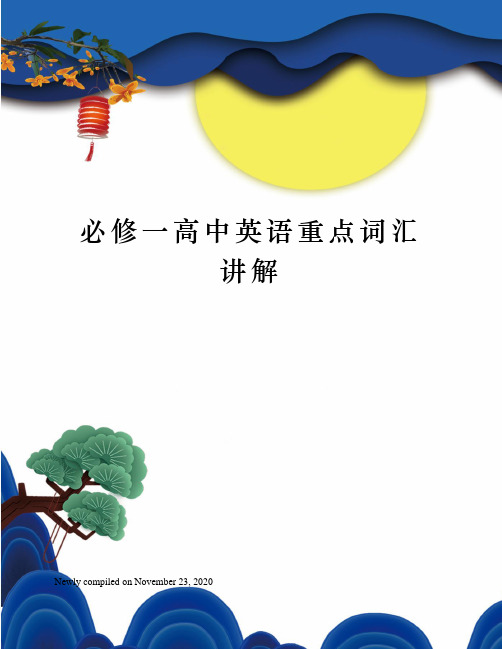
必修一高中英语重点词汇讲解Newly compiled on November 23, 2020Unit 1 Friendship一:重点词的讲解up把......加起来Please add up the scores and we'll see who won.把你们的得分加起来,我们就可以看出谁赢了。
Add的用法(1)增加;增添Add up to 加起来等于;总计;结果是Add A to B/add A to B 把A和B加起来Add to 增加;增添Please add some salt to this dish.往这道菜里搁点盐。
(2)补充说;继续说;其后常跟that从句或是和直接引语连用He added that they return soon.他补充说他很快就回来。
I have nothing to add to my statement.我对我的陈述没有什么可补充的。
(1)adj. 心烦意乱的;不愉快的;肠胃不适Be upset about/over sth. 为某事烦心。
Be upset that... 心烦There is no point getting upset about it.犯不着为此事烦心。
(2)使不安It upsets sb. that 让某人心烦的是It upsets sb. to do sth. 做某事让某人不快It upsets me to think of her all alone in that big house.想到她孤身一人守着那所大房子,我就感到不舒服Vt. 忽视;对...不理睬;不顾He had completely ignored her remark, preferring his own theory. 他完全不理睬她的评论,认为自己说的更有道理。
Ignorant adj. 不知的;无知的Ignorance n. 无知;愚昧Be ignorant of/about sth. 对某事不了解Be in ignorance of sth. 不知某事;对某事不了解V.使平静;使镇静;安静The excited girl quickly calmed down.那个激动的女孩很快的平静了下来。
英语重点词汇how come用法详解

英语重点词汇how come用法详解1.why 是最常见的,万能的问原因,什么时候都可以用,但其他两个不可以! (用于问句)为什么,为何;(反问,表示不必)何必;(说明理由)为什么,…的原因一般结构:why+一般疑问句语序2.how come 是口语用法,不在书面语中出现;为什么,怎么会……一般结构:how come+陈述句语序?.what for就更加简单易懂3.what for?是一个完整的提问了,后面什么不接,直接表示为什么,对上一句提问(或者对当时出现的场景提问)…怎样;为何;处罚;为什么下面还是用例句来进行解析;1)Why were you late?你为什么迟到?Tell me why you did it.告诉我你为什么这样做。
‘I would like you to go.’‘ Why me? ’“我希望你去。
”“为什么要我去呢?”Why oh why do people keep leaving the door open? 人们到底为什么总敞着门呢?Why get upset just because you got one bad grade? 何必因为一次成绩不好就想不开呢?Why bother to write? We'll see him tomorrow.还费事写信干什么?我们明天就见到他了。
Why hasn't he brought the whisky?他为什么没把威士忌拿来?《柯林斯高阶英汉双解学习词典》Why don't you look where you're going?走路怎么不看着点儿道呢?《柯林斯高阶英汉双解学习词典》Why didn't he stop me?为什么他没阻止我?《柯林斯高阶英汉双解学习词典》Why can't I remember the exact year we married?为什么我记不起我们结婚的准确年份了?Why don't you come home with me until you sort things out? 你何不先和我一起回家,等事情解决了再走?2)'How come we never know what's going on?' he groused “为什么我们对正在发生的事情总是一无所知?”他抱怨说。
英语重点词汇good考点解析详解

英语重点词汇good考点解析详解1、be good at 意为“擅长bai……”,表示“du擅长于某一学科知识zhi或技能”,也可表示“在……方面做dao得好。
后接名词、代词或V-ing形式。
例:I'm good at drawing。
我擅长绘画。
He is good at maths.他擅长数学.2、be good for意为“对……有好处、能”。
例:Running is good for your health. 跑步对你身体有好处。
Eating more vegetables is good for your health. 多吃蔬菜对你的健康有好处。
Exercise is good for health.运动有益于健康。
3、be good with意为“灵巧的;与……相处得好”。
例:She is good with her hands. 她手很巧。
He is very good with the children. 他与这些孩子处得很好。
4、be good to意为“对……友好”。
to后一般接表示人的代词或名词,其中good可用friendly代替。
例:Miss Li is very good/friendly to us student. 老师对我们学生非常好。
My friend was good to me when I was ill. 我生病时我的朋友对我关怀备至。
5、Be good! 好好的!别淘气!听话,用于口语交流中。
例:I'll be good, I swear! 我会听话的,我发誓!名词 n.1.利益;好处,用处[U]What good will it do you?这会给你带来什么好处呢?2.善;好事;慷慨的行为[U]There is good in her, in spite of her bad reputation.尽管她名声不佳,她还是有善的一面.3.长处,优点[U]4.(总称)好人[the S][K]Christians believe the good will go to heaven when they die. 基督教徒相信好人死了进天堂.定语从句的功能相当于一个形容词,对先行词起修饰、限制的作用;同位语从句的作用相当于一个名词,说明前面的名词的具体内容。
(完整word版)研究生英语考研英语重点词汇辨析及解析

同义词、混淆词辨析1.assess,estimate, appraise, evaluate对客体的重要性形成定论,评估,估算,评价【辨析】estimate [ˈestimeit]暗示评价的主观性和不精确appraise [əˈpreɪz] 表示专业水准的评估,名词appraisalassess [əˈses]表示为确定某物的应税价值而做出的权威估价evaluate [iˈvæljueit]表示在确定价值时经过了深思熟虑,不一定是金钱价值2. assume, suppose假定, 设想,担任; 承担; 接受【辨析】suppose [səˈpəuz]最不正式,表示根据一定证据做出的见解,assume [əˈsju:m] 用于逻辑推理,强调一种缺乏证据的结论,以检验某种建议。
3. consistent, persistent【辨析】consistent [kənˈsistənt]表明持之以恒,表明一种好的意志品质persistent [pəˈsistənt]也有坚持的含义,但有时表明顽固不化。
4.create,compose, invent, design, produce, manufacture创造, 创作, 引起, 造成【辨析】create [kriˈeit]指“ 创造出原来不存在或与众不同的事物”, compose [kəmˈpəuz]指“ 创作(诗、画、音乐或文章等)”com是在一起,manufacture [ˌmænjuˈfæktʃə]强调大规模制造5.evident, apparently.明显, 显著, 明白, 迹象【辨析】evident [ˈevidənt]指明显的有根据,所以表达作者的赞成apparently [əˈpærəntlɪ] 指看起来的明显,但事实并非如此,经常是假象。
6.factors,element, ingredient.因素,要素,因数【辨析】factor [ˈfæktə] 具有数学及解析意味,是一个整体的成分;element [ˈelimənt] 强调这一部分是基础性的,不可或缺的,如元素;ingredient [inˈɡri:djənt]只是表明构成一种混合物的成分。
新外研高中英语必修三unit3 核心重点词汇讲解

Unit 3 核心重点词汇讲解1. press v. 压,按,熨平,催促n. 报刊,新闻界;新闻工作者pressure n.压力,压强pressed adj.时间紧迫/缺钱等press sb to do/into doing sth 催促某人做某事press sth on sb勉强某人接受be hard-pressed to do sth 很难做某事press the button 按按钮the press 新闻界(后面谓语一般用复数)press conference 新闻发布会the Oxford University Press 牛津大学出版社put sb under pressure 使...处于压力之下reduce/relieve/release pressure 减轻/释放压力2.shoot -shot-shot 射击;拍摄;发芽;投篮,射门,飞驰n. 嫩芽,新枝;拍摄,打猎shoot past 飞驰而过shoot up 快速长高,猛涨shoot a basket 投篮shoot a movie 拍电影bamboo shoots 竹笋have shot your bolt 竭尽全力;倾其所有be like shooting fish in a barrel易如反掌;探囊取物shoot yourself in the foot 搬起石头砸自己的脚Eg.1)She shot an angry glance at him.她很生气,瞪了他一眼.2)He shot from the middle of the field and still managed to score. 他在中场投篮,仍成功命中。
shot n. 照片;镜头;射球;尝试,注射have a flu shot 打流感预防针give it a shot 试一下screenshot 屏幕截图3.powder n. 粉末v. 搽粉To face the powder,not to powder the face.4. Living without an aim is like sailing without a compass.生活没有目标就像航海没有指南针。
高一英语必修一unit1重点词汇短语讲解
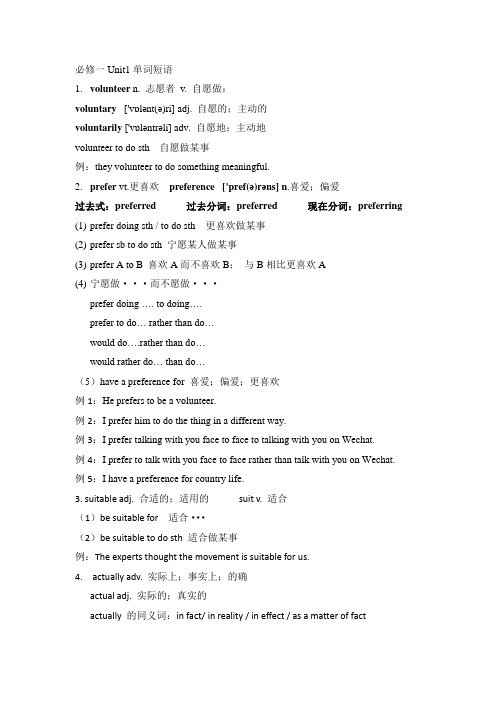
必修一Unit1单词短语1.volunteer n. 志愿者v. 自愿做:voluntary ['vɒlənt(ə)ri] adj. 自愿的;主动的voluntarily ['vɒləntrəli] adv. 自愿地;主动地volunteer to do sth 自愿做某事例:they volunteer to do something meaningful.2.prefer vt.更喜欢preference ['pref(ə)rəns] n.喜爱;偏爱过去式:preferred 过去分词:preferred 现在分词:preferring(1)prefer doing sth / to do sth 更喜欢做某事(2)prefer sb to do sth 宁愿某人做某事(3)prefer A to B 喜欢A而不喜欢B;与B相比更喜欢A(4)宁愿做···而不愿做···pre fer doing …. to doing….p refer to do… rather than do…w ould do….rather than do…w ould rather do… than do…(5)have a preference for 喜爱;偏爱;更喜欢例1:He prefers to be a volunteer.例2:I prefer him to do the thing in a different way.例3:I prefer talking with you face to face to talking with you on Wechat.例4:I prefer to talk with you face to face rather than talk with you on Wechat. 例5:I have a preference for country life.3. suitable adj. 合适的;适用的suit v. 适合(1)be suitable for 适合···(2)be suitable to do sth 适合做某事例:The experts thought the movement is suitable for us.4. actually adv. 实际上;事实上;的确actual adj. 实际的;真实的actually 的同义词:in fact/ in reality / in effect / as a matter of fact5. challenge n. 挑战;艰巨任务v. 怀疑;向···挑战challenger n. 挑战者challenging adj. 有挑战性的face a /the challenge 面对挑战meet a/the challenge 迎接挑战accept a/the challenge 接受挑战challenge sb. to sth. 向某人挑战某事6. fluent adj. 流利的;熟练的fluently adv. 流利地fluency n. 流利;流畅be fluent in 在···方面流利7. graduate v. 毕业;获得学位n. 毕业生graduation n. 毕业;毕业典礼(1) graduate from… 毕业于···(学校)(2) graduate in… 毕业于···(专业)例1:He graduated from Beijing Normal University.例2:He graduated in English.8. recommend vt. 建议;推荐;介绍(1)recommend doing sth. 建议做某事(2)recommend sb to do sth 建议某人做某事有类似用法的还有:allow, permit, forbid, advise(3)r ecommend that… 建议···(从句中的谓语动词应用“should +动词原形”,其中should 可以省略)(4)recommend sth to sb (recommend sb sth)把某物推荐给某人(5)r ecommend sb as… 推荐某人担任···例1:He recommended reading the book before seeing the movie.例2: The doctor recommended his patient to go out for a walk.例3: The teacher recommended that everyone (should) take an active part in the English party.例4:I recommend the book to all my students.例5:I recommend her as your secretary.9.advanced adj. 高级的;高等的;先进的advance n./v. 前进;发展in advance = ahead of time= ahead of schedule 提前;预先10. quit v. 停止;戒掉;离开(工作职位、学校等)(1) quit doing sth 停止做某事(2) quit as… 辞去···(职务)例: He has decided to quit as manager of the team.11. responsible adj. 负责的;有责任的responsibility n. 责任;义务(1)be responsible for 对···负责(2)take responsibility for 对··负责(3)take on responsibilities 承担责任(4)a sense of responsibility 责任感(5) It is a responsibility to do sth 做某事是一种责任12. obviously adv. (常用于句首)显然;明显地obvious adj. 明显的;显而易见的I t is obvious/clear that… 很明显;很显然It seems obvious/clear that… 很明显;很显然13. schedule n. 工作计划;日程安排vt. 安排;为···安排时间;预定(1) on schedule =on time 按时;准时;按预定时间(2) ahead of schedule =ahead of time = in advance提前; 早于预定时间(3) behind schedule 晚于预定时间(4) as scheduled 如期;按照预定时间(5) be scheduled for + (时间)被安排在···(时间);定于···;预定····(6) be scheduled to do sth 被安排做某事;预定/预计做某事例1:You’d better finish the project on schedule.例2:The party is scheduled for the weekend.例3:The film star is scheduled to arrive in Shanghai at ten o’clock.14.editor n. 主编;编辑edit v. 编辑15.adventure n. 冒险;奇遇adventurous adj. 爱冒险的;喜欢冒险的16.survival n. 生存;幸存survive v. 幸存;生存survivor n. 幸存者17.expert n. 专家adj. 熟练的;内行的be expert at/in 擅长;精通;在···方面是内行例:She is expert at making cheap but stylish clothes.18.behaviour n. 行为;举止behave v. 行为;举止;表现(1)behave oneself守规矩;有礼貌;举止规矩(2)behave well 表现得好;举止得体(3)behave badly 表现得不好;举止不文明;没有礼貌19.attract vt. 吸引;引起···的注意(兴趣)attraction n. 吸引;吸引力;具有吸引力的人或事物attractive adj. 迷人的;有吸引力的···(1)be attracted to 喜爱(2)be attracted by 被···所吸引(3)attract... to...把···吸引到···(4)attract one’s attention 引起某人的注意。
(完整)高考英语重点长难句及词汇分析
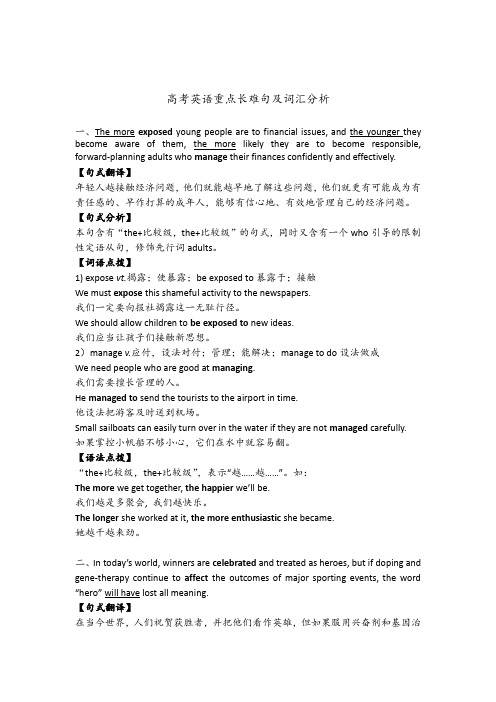
高考英语重点长难句及词汇分析一、The more exposed young people are to financial issues, and the younger they become aware of them, the more likely they are to become responsible, forward-planning adults who manage their finances confidently and effectively.【句式翻译】年轻人越接触经济问题,他们就能越早地了解这些问题,他们就更有可能成为有责任感的、早作打算的成年人,能够有信心地、有效地管理自己的经济问题。
【句式分析】本句含有“the+比较级,the+比较级”的句式,同时又含有一个who引导的限制性定语从句,修饰先行词adults。
【词语点拨】1) expose vt.揭露;使暴露;be exposed to暴露于;接触We must expose this shameful activity to the newspapers.我们一定要向报社揭露这一无耻行径。
We should allow children to be exposed to new ideas.我们应当让孩子们接触新思想。
2)manage v.应付,设法对付;管理;能解决;manage to do设法做成We need people who are good at managing.我们需要擅长管理的人。
He managed to send the tourists to the airport in time.他设法把游客及时送到机场。
Small sailboats can easily turn over in the water if they are not managed carefully.如果掌控小帆船不够小心,它们在水中就容易翻。
[全]中考英语重点词汇讲解
![[全]中考英语重点词汇讲解](https://img.taocdn.com/s3/m/7f61d53d856a561253d36f1f.png)
中考英语重点词汇讲解Like 的用法两个常用词性:介词:翻译成"像,类似";及物动词:翻译成"喜欢";1. what`s something like ?可以用来询问天气,事物等怎么样场景一:询问天气----what`s the weather like ?天气怎么样?----it is fine!和好!场景二:询问考试----what`s the exam like ?考试怎么样?----so difficult!很难!2. What be somebody like ?询问某人的品质,性格等内在的东西----What is her mother like?她妈妈怎么样?----She is a very kind woman.她是一个非常善良的女人。
3.What do somebody look like?某人看上去如何,侧重于外表----What does she look like ?她长什么样?----She is a girl with long hair.她是一个长头发的女孩。
4.what does somebody like ?询问某人喜欢什么,like 是动词----what do you like ?你喜欢什么?----I like reading.我喜欢读书。
5. How does somebody like ...? 询问某人认...怎么样----How do you like the computer ?你觉得这台电脑怎么样?----Its wonderful!非常棒!6. look like:看起来像……,强调的是外观You look like a successful man.你看起来像个成功的人。
7. feel like:(1) 感觉像…The cloth feel like silk.这块布摸起来像丝绸。
(2)想要某事,想做某事I don`t feel like cooking.我不想做饭。
英语重点语法词汇解析by a factor of

英语重点语法词汇解析by a factor of词组by a factor of 在《朗文双解》中的解释为:"if something increases or decreases by a factor of N, it increases or decreases by N times."简单说,就是将一个数字乘以N或除以N。
1. Increase/grow/exceed/rise/ go up...by a factor of N (times)增加到N倍,或者增加了N-1倍:The output of diesel oil for farm use has been increased by a factor of 4 (times) these years.这些年来,用于农业生产的柴油产量增至四倍/ 增加了三倍,即,原产量x4。
下面是词典中疑似错误译法:The cost of butter quadrupled and bread prices increased by a factor of five.黄油价格涨了4倍,面包价格涨了5倍。
《柯林斯高阶英汉双解学习词典》小编译为:黄油价格涨至4倍,面包价格涨至5倍。
或黄油价格涨了3倍,面包价格涨了4倍。
The real wage of the average worker has increased by a factor of over ten in the last 70 years.近70年来工人的实际工资平均增长超过了十倍。
《牛津高阶英汉双解词典》小编译为:近70年来一般工人的实际工资增长至十倍多。
或:近70年来一般工人的实际工资增长了九倍多。
2. decrease/fall/reduce...by a factor of N times减少到1/N,或者减少了(N-1)/N。
The equipment under development will reduce the error probability by a factor of 7.正在研制的设备将使误差概率降低6/7。
新外研高中英语必修三unit4 核心重点词汇讲解

B3U4 重点词汇讲解1.greet 问候,欢迎;…映入眼帘Eg. 1)The two friends greeted each other with bear hugs.两个老朋友见面时相互热烈拥抱。
2)When we reach the top of the hill, we were greeted by a magnificent view of the sea.当我们到达山顶时,映入我们眼帘的是一片壮丽的海景。
greeting n.问候,致意exchange greetings 互相问候2.broadcast v.广播,传播n. 广播节目live broadcast 现场直播broadcasting广播业broadcaster广播员3.load n.负载物,工作量,负担v. 装载loads of /a load of 许多unload 卸下(货物,感情) unload sth on sb 向某人倾诉某事;把某事推到某人身上be loaded with 充满的;装满的overload超载;负担过重upload/download上传/下载Eg. 1)It took a load off my mind to know they had arrived safely.得知他们平安到达后,我如释重负。
2)Get a load of that dress!你瞧那条裙子!4.battle v/n 斗争,战斗battle against/with 与…斗争battle for 为…而斗争battlefield战场be half the battle 成功了一大半battle it out 决一胜负Eg. The rescue attempt was a battle against time救援行动是一场与时间的较量。
5.fold v.折叠,包;裹n.折痕unfold展开,打开fold one’s arms交叉双臂fold…in ones arms把…抱在怀里6.sculpt v.雕刻,雕塑sculpture n.雕像,雕刻品sculptor n.雕塑家7.exhibit v.展出展览;显示,显出n. 展览品exhibition n. 展览会,展览,显示be on exhibition=on display 在展出Eg. 1)The exhibition will be held from Oct.1st to Oct.30 in the city library.这个展览10月1日到10月30日将会在城市图书馆举行.2)The gallery exhibits many contemporary sculpture and photography.该画廊主要展出当代雕塑和摄影作品.8.seal n. 海豹; 封蜡,封条v.密封9.calligraphy 书法calligrapher 书法家Eg.Yan Zhenqing is a famous calligrapher in Tang Dynasty whose calligraphy is vigorous and forceful.颜真卿是唐朝有名的书法家,他的书法苍劲有力。
四级高频词汇的词根词缀与词源解析

四级高频词汇的词根词缀与词源解析四级高频词汇是大家备考英语四级考试时经常遇到的重点单词。
词根词缀与词源解析是学习英语词汇的一种有效方法,可以帮助我们理解单词的内涵和扩展词义。
下面我们将通过对四级高频词汇中的一些典型词汇进行词根词缀与词源解析,帮助大家更好地掌握这些词汇。
一、词根词缀解析1. communicate: 来自拉丁语的“communicare”,意为“分享、交流”。
其中“com”为前缀,表示“共同、一起”,“unicate”为词根,表示“通讯、交流”。
通过词根词缀的分析,我们可以推断出"communicate"的意思为“共同交流、分享信息”。
2. memorize: 源自拉丁语的“memor”, 意为“记忆、记住”。
"ize"为动词后缀,用于构成动词。
综合词根和后缀的含义,我们可以得出"memorize"的意思为“记住、记忆”。
3. misunderstanding: "mis"为前缀,表示“错误、误解”,"understand"为词根,表示“理解、明白”,"ing"为动词的现在分词后缀。
通过这些词根和后缀的组合,我们可以理解"misunderstanding"的意思为“误解、误会”。
二、词源解析1. examine: 这个词来自于拉丁语“examinare”,由“ex”和"aminare"构成。
“ex”为前缀,表示“出、向外”,“aminare”为词根,意为“审查、考试”。
通过词源的解析,我们可以推断出"examine"的意思为“审查、考察”。
2. finance: "finance"这个词的源头可以追溯到拉丁语的"finis",意为“结束、结束点”。
随着时间的推移,它衍生出引申义为“结束的时期、结束的线索或线路”。
高中英语 新版牛津译林第二册unit1重点词汇知识点详细讲解
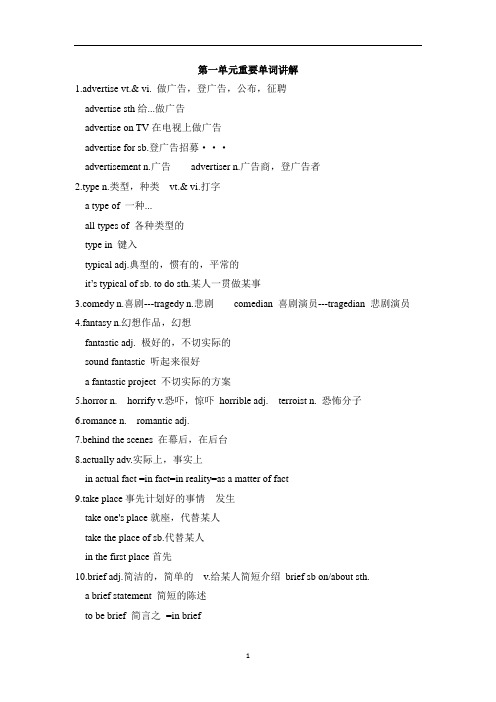
第一单元重要单词讲解1.advertise vt.& vi. 做广告,登广告,公布,征聘advertise sth给...做广告advertise on TV在电视上做广告advertise for sb.登广告招募···advertisement n.广告advertiser n.广告商,登广告者2.type n.类型,种类vt.& vi.打字a type of 一种...all types of 各种类型的type in 键入typical adj.典型的,惯有的,平常的it’s typical of sb. to do sth.某人一贯做某事edy n.喜剧---tragedy n.悲剧comedian 喜剧演员---tragedian 悲剧演员4.fantasy n.幻想作品,幻想fantastic adj. 极好的,不切实际的sound fantastic 听起来很好a fantastic project 不切实际的方案5.horror n. horrify v.恐吓,惊吓horrible adj. terroist n. 恐怖分子6.romance n. romantic adj.7.behind the scenes 在幕后,在后台8.actually adv.实际上,事实上in actual fact =in fact=in reality=as a matter of fact9.take place事先计划好的事情发生take one's place就座,代替某人take the place of sb.代替某人in the first place首先10.brief adj.简洁的,简单的v.给某人简短介绍brief sb on/about sth.a brief statement 简短的陈述to be brief 简言之=in brief11.familiar adj. 熟悉的;常见的sth is familiar to sb. 为...所熟悉sb.is familiar with sth 熟悉某物look familiar 面熟12.envelop v.包裹,包住envelope n. 信封 a sheet of envelope/paper13.attach vt. 使依附;贴上vi. 附加;attach... to 附在...上be attached to 附属于,一脸与attach importance to认为...有重要性Much importance is attached to···更重视···14.visit v./n. visual adj.视力的,视觉的15.frequent adj.频繁的经常的frequently adv. frequency n.16.enable v. 使能够;使成为可能enable sb. to do sth 使某人能够做某事enable something to happen 使成为可能17.aid n./vi./vt. 援助,帮助aid sb. in doing sth. /with sth.first aid 急救18.prefer vt. 更喜欢;宁愿;提出;提升vi. 喜欢;愿意prefer to do 更喜欢做某事prefer A to B 喜欢A 胜过喜欢Bprefer doing ...to doing=prefer to do rather than do..宁愿做...而不愿做prefer -preferredpreference n.偏心,偏爱19.approach n. 方法,方式v. 走进,接近;与……接洽,处理;an approach to (doing)sth 做某事的方法/途径take an approach采用一种方法approach the house 接近房子approach the problem 处理问题20.revise vt. 修正,修订;复习,温习revise a book 修订书revise for an examination复习迎考21. not to mention更不用说without a mention没有提及22.history historian n.历史学家23.ensure +句子/n. 确保···,保证···24.lecture n. 演讲;讲稿;教训vt. 责备,训斥,训诫vi. 开讲座lecturer 讲师,演讲者a lecture on/about 关于...的讲座lecture on 讲授lecture sb. about (doing)/on sth.关于某事训斥某人= scold sb. for (doing) sth.责骂某人因为某事25.justice n. 司法,法律制裁;正义;法官do justice to+n./doing 公平对待,恰当处理social justice 社会公正a sense of justice正义感26.award n. 奖;奖学金v. 授予win an award获奖award sb. sth=award sth to sb.授予某人某种荣誉27.perform vt. 执行;完成vi. 执行,机器运转;表演perform a task 执行任务perform an operation 做手术perform well表现的好performance n. 性能,绩效;表演performer n. 演出者;28.locate v.定位,坐落于···29.martial adj.战争的,军事的marital art 武术30. in addition to 除...以外in addition另外(单独做状语)31.desert n. 沙漠,荒原v. 遗弃;舍弃in the desert 在沙漠里desert one's post擅离职守deserted adj.空寂无人的32.adapt vt. 改编,改写be adapted from使适应adapt oneself tovi. 适应adapt to33.regard ···as···把···当作···来对待=treat/look on···as···34.solution to35.eventually = finally =at last = in the end36.fancy adj.复杂的,花哨的,昂贵的vt.想要,想做= feel like + n./doing倾慕,爱慕+ sb.37.narrow adj.狭窄的,勉强的,刚刚好的a narrow victory 险胜a narrow escape 差一点没逃掉,九死一生,千钧一发a narrow miss 差点被打中38.despite prep. +n./doing =though+句子尽管in spite of + n./doing 尽管39.pull up 停车,停止40.wave vt. ~ one’s hands tovi. ~ ton. 海浪,大量出现,大量涌现41.recollect = recall = look back on 回想起,回忆起42.crook n.骗子,臂弯,肘弯v.弯曲adj. 生病,有病crooked adj.弯曲的,不直的。
高中英语真题-Unit1重点词汇讲解_1

Unit1重点词汇讲解(一)重点动词讲解1. rankvi. & vt. 属于某等级,将……归为某等级He ranks among the best pupils of his grade.他是他们年级最好的学生之一。
n. (尤指较高的)等级,级别He is a physicist of the first rank.他是一流的物理学家。
2. associatevt. 联想,联系Many people associate dark clouds with depression.许多人把乌云与沮丧联系起来。
【拓展】association n. 联合, 结合;协会, 社团Our long association with your company has brought great be nefits.我方和贵公司的长期合作带来了巨大的利益。
The association is/are having its/their annual conference nextweek.该协会在下个星期举行年度会议。
3. owev. 欠,应向……付出;得感谢,应归功于I will owe nearly a hundred pounds on that car.我为买车还将欠将近100英镑。
We owe everything to you, doctor.多亏了您,医生。
【拓展】owing to由于,因为Now his crops completely failed, owing to a disease that had broken out last month.由于上周爆发的病害,他的庄稼全部欠收。
表示“因为、由于”的类似短语还有 due to/thanks to/as a result of等4. equipv. 配备,装备equip sb./sth. with sth.be equipped with sth. 装备有……The soldiers were well equipped with the latest weapons.士兵们配备好了最新式的武器。
英语重点词汇given用法详解
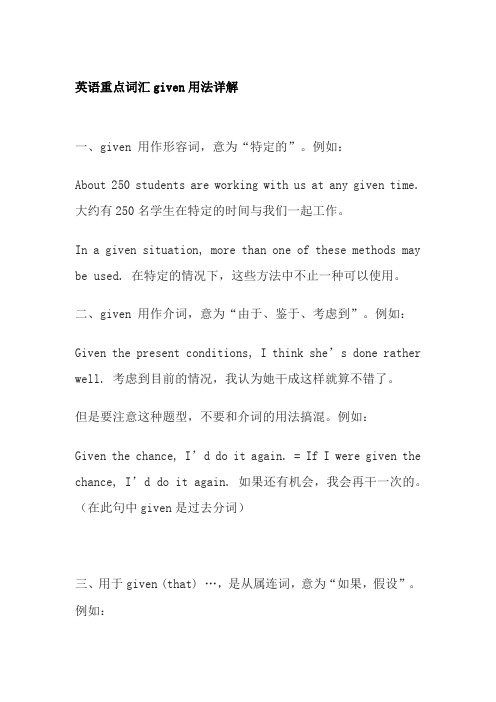
英语重点词汇given用法详解一、given 用作形容词,意为“特定的”。
例如:About 250 students are working with us at any given time. 大约有250名学生在特定的时间与我们一起工作。
In a given situation, more than one of these methods may be used. 在特定的情况下,这些方法中不止一种可以使用。
二、given 用作介词,意为“由于、鉴于、考虑到”。
例如:Given the present conditions, I think she’s done rather well. 考虑到目前的情况,我认为她干成这样就算不错了。
但是要注意这种题型,不要和介词的用法搞混。
例如:Given the chance, I’d do it again. = If I were given the chance, I’d do it again. 如果还有机会,我会再干一次的。
(在此句中given是过去分词)三、用于given (that) …,是从属连词,意为“如果,假设”。
例如:Given that conflict is inevitable, we need to learn how to manage it. 如果冲突是不可避免的,那么我们就要学会如何处理它。
四、given 可用作名词(可数),意为“基本事实;不争的事实”。
例如:It is a given that most animals will protect their young. 大部分的动物都会保护它们的幼仔,这是一个不争的事实。
1. Would [Will] you…类句型。
如:Would [Will] you do me the honour of dancing with me? 能请你跳曲舞吗?Would [Will] you do me the pleasure of dancing with me? 能请你跳曲舞吗?Would [Will] you honour me by coming to the party tonight? 请你赏光出席今晚的聚会好吗?Would [Will] you come to our party, please? 请来参加我们的聚会好吗?Would [Will] you honour me with a dance? 能请你跳曲舞吗?Would you like a cup of tea? 要喝杯茶吗?Would you like to sit with us? 你愿和我们坐一起吗?Will you join us for dinner? 请你和我们一起吃饭好吗? 2. Won’t you…类句型。
新外研版高中英语必修三unit 1 核心重点单词讲解

B3U1核心重点词汇讲解1.agony =torture=suffering 痛苦,苦难agony column 答读者问专栏2.let down=disappoint 使失望,辜负3.steam n.水蒸气steamed bread/bun 馒头4.let off/ set off fireworks 放鞭炮5.loose adj. 宽松的;自由的;不精确的;说话随便的loosely adv. 宽松地loosen v. 松开6.bite one’s lip 咬嘴唇purse one’s lip 撅嘴唇7.sink-sank-sunk v.使下沉、陷入、坐下;下降、降低n.洗脸盆,洗碗池sink into an armchair 坐到扶手椅上be sunk into thought /despair 陷入沉思/绝望sb’s heart sinks. 某人心灰意冷8.fault n. 责任、过错;缺点、故障v.发现错误,找缺点faulty有错的faultless无错的,完美的It’s sb’s fault that… …是某人的错be at fault 有过错,应当负责find fault with挑剔,找茬9.resolve v. 解决,决心做n.决心resolution n. 解决,决心new year’s resolution 新年计划resolve an issue/a crisis 解决问题/化解危机resolve to do sth 决心做某事=be resolved to do sth10.develop a strategy for doing sth 制定做某事的策略strategic adj. 战略性的11.signal n.信号灯, 暗号v.发信号,示意;表明give sb a signal to stop 示意某人停下be a clear/strong signal of 清楚表明…signal a warning 发出警示signal (to) sb to do sth 示意某人做某事12.take a deep breath 深吸一口气out of breath 气喘吁吁take one’s breath away令人惊叹hold one’s breath屏住呼吸catch one’s breath 喘口气breathe v.呼吸,低声说breathless adj. 气喘吁吁的,目瞪口呆的breathtaking adj.令人惊叹的breathe a sign of relief 松一口气not breathe a word 一个字都不透露出去13.concern v. 涉及,与…有关; 使担心n. 担心,担心的事The story concerns/follows… 故事讲的是…It concerned sb that 令某人担心的是…Eg. Matters of pollutionand the environment concern us all.污染和环境问题与我们每个人都息息相关.concerned adj. 有关的; 担心的be concerned with 与…相关be concerned about 担心as far as I am concerned 就我而言unconcerned 漠不关心的concerning=regarding 关于14.annoy v.使恼怒,使生气annoyance n. 恼怒,生气annoying 令人恼怒的annoyed 恼怒的be annoyed with sb对某人很生气be annoyed at /about sth 对某事很生气15.adjust v.调整,调节;使适应,使习惯adjustment n. 调整;适应adjustable adj.可调节的adjust to doing sth 适应/习惯于做某事adjust oneself to sth 适应well-adjusted 能适应环境的16.duty n. 责任,义务;税 a sense of duty 责任感carry out one’s duties 履行职责do one’s duty 尽自己的职责be on/off duty值班/下班duty-free shops 免税店dutiful adj. 尽责的,孝顺的17.an accident waiting to happen 隐患It's no accident that… … 绝非偶然by accident=by chance=accidentally 偶然地accidental adj. 偶然的on purpose= deliberately 有意地,故意地18.core n.果核,核心adj. 核心的,最重要的v. 去(水果)核core values 核心价值观plex adj. 复杂的,难懂的=complicated n. 建筑群complexity n.复杂性20.forgive-forgave-forgiven 原谅forgiveness n. 原谅,宽恕forgiving 宽容的forgive sb for(doing) sth 原谅某人某事forgive and forget 不念旧仇21.criticize/criticise v.批评;评论criticism n. 批评;评论criticise sb for doing sth 因某事批评某人criticize sth favorably给予某物好评critical adj.批判的;紧要的,危急的critical thinking批判性思维be critical to 对…至关重要22.embarrass v.使尴尬embarrassment n.尴尬;使人为难的事embarrassing adj. 令人尴尬的embarrassed adj. 尴尬的,窘迫的financially embarrassed 拮据的It embarrasses sb to do sth 做某事使某人感到尴尬23.boxing ring 拳击台24.weave-wove-wowen v.编织;编写;迂回前进25.justify v.证明…正确justified adj. 有正当理由的,合乎情理的26.to be frank 坦率地说frankness n. 坦率frankly adv. 坦率地27.tear n. 眼泪v. tear-tore-torn 撕碎,折磨be close to tears 快要哭出来了tears well up one’s eyes 眼泪从眼睛里涌出来move sb to tearsthis使某人感动得落泪f ight back one’s tears 强忍住眼泪tear apart 使分开tear down 拆毁,拆除tear up撕碎be torn between A and B 在A和B之间痛苦抉择28.the former… the latter… 前者…后者… in one’s latter years 在某人的晚年29.moreover=furthermore=in addition =what's more=besides 此外,而且30.independent adj. 独立的independence n. 独立31.fall apart 破碎,崩溃apart from 除了…之外(还)set…apart from 使与众不同,使突出be worlds/poles apart 完全不同,截然相反32.fence n. 篱笆,栅栏v.围住,隔开fence …in 围住,限制…自由be on the fence 保持中立mend fences with sb 与…查重修旧好。
英语重点词汇语法详解分析physical store
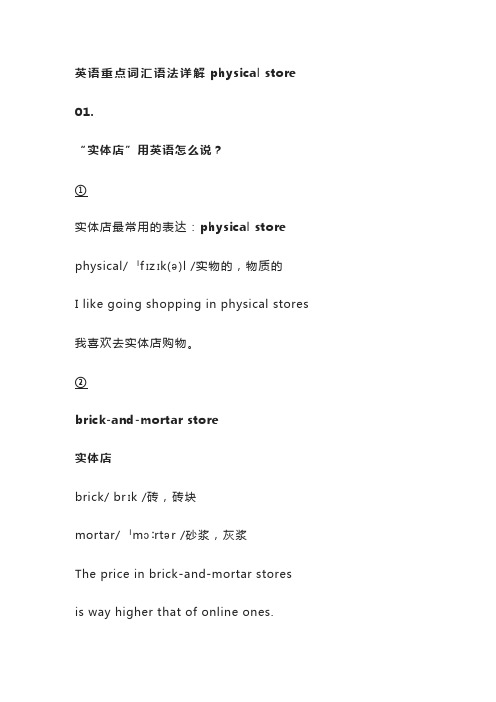
英语重点词汇语法详解physical store 01.“实体店”用英语怎么说?①实体店最常用的表达:physical store physical/ ˈfɪzɪk(ə)l /实物的,物质的I like going shopping in physical stores 我喜欢去实体店购物。
②brick-and-mortar store实体店brick/ brɪk /砖,砖块mortar/ ˈmɔːrtər /砂浆,灰浆The price in brick-and-mortar storesis way higher that of online ones.实体店的价格比网店贵多了。
02.“网店”用英语怎么说?online store网店shop on line 在网上购物More and more people like to shop on line越来越多的人喜欢在网上购物flagship store 旗舰店flagship/ ˈflæɡʃɪp /旗舰The company is opening a new flagship store in Changsha. 这家公司将在长沙新开一家旗舰店。
购物砍价学会这几句实用表达:Can you give me a little deal on this?这能卖得便宜一点吗?Can you lower the price?能便宜一点给我吗?Is there any discount on bulk purchases? 我多买些能打折吗?Give me a discount. 给我打个折吧。
01.“大雪”用英语怎么说?“大雪”为什么不是“big snow”呢?但是在雪花身上确是不适用的”。
“大雪”的正确翻译是“heavy snow”。
那为啥是heavy不是big呢?heavy表示大量的形容天气现象heavy snow大雪小雪可以说:light snowheavy rain大雨big体积大的,表达具体的东西a big snowflake一大片雪花a big raindrop一大滴雨水Heavy snow has covered the ground. 大雪复盖了地面。
英语重点核心词汇scholar举例详解分析表格版

feed on
以...为食物、以...为能源
Bats feed on insects
feed on rice
832
(V)by means of
用、依靠
express thoughts by means of words
communicate by means of letters
succeed by means of hard work
851
in a word
总而言之、简言之
In a word,she is a kind girl.
852
bring out
出版、引起、使显出
bring out aห้องสมุดไป่ตู้novel
bring out the beast
853
on sale
廉价出售
buy the shirt on sale
The shoes are on sale for only 10 yuan.
836
schoolbag
n.书包
buy a schoolbag for her son
837
certainly
adv.肯定、确定、当然、行
She will certainly win the election.
838
take up
开始从事、着手处理、把...继续下去
He took up farming.
833
keep up
(使)继续下去、保持下去
keep up the family tradition
Prices have kept up all the year.
834
shop
n.商店
英语重点词汇语法详解the following句型分析
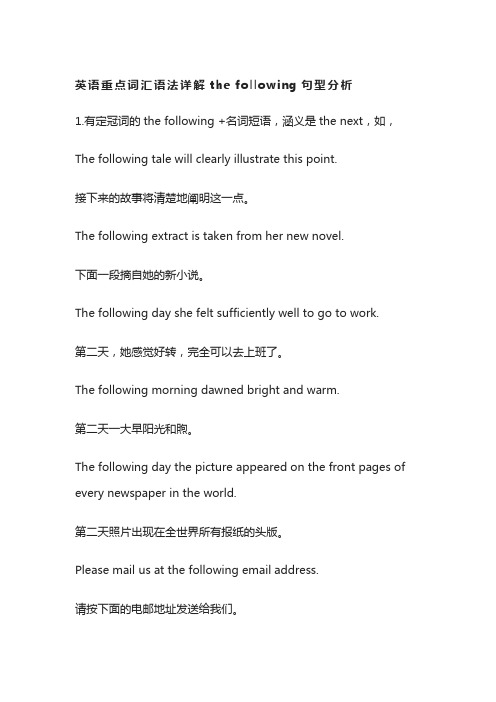
英语重点词汇语法详解the following句型分析1.有定冠词的the following +名词短语,涵义是the next,如,The following tale will clearly illustrate this point.接下来的故事将清楚地阐明这一点。
The following extract is taken from her new novel.下面一段摘自她的新小说。
The following day she felt sufficiently well to go to work.第二天,她感觉好转,完全可以去上班了。
The following morning dawned bright and warm.第二天一大早阳光和煦。
The following day the picture appeared on the front pages of every newspaper in the world.第二天照片出现在全世界所有报纸的头版。
Please mail us at the following email address.请按下面的电邮地址发送给我们。
It was decreed that the following day would be a holiday.法令宣布第二天为休假日。
The following day the pain returned.第二天又疼起来了。
She had agreed to have dinner with him in town the following weekend.她答应下一个周末和他在城里共进晚餐。
The following information was correct at time of going to press.下列信息在付印时准确无误。
I went to Paris on Thursday, and came back the following Monday.我星期四去了巴黎,第二周的星期一就回来了。
- 1、下载文档前请自行甄别文档内容的完整性,平台不提供额外的编辑、内容补充、找答案等附加服务。
- 2、"仅部分预览"的文档,不可在线预览部分如存在完整性等问题,可反馈申请退款(可完整预览的文档不适用该条件!)。
- 3、如文档侵犯您的权益,请联系客服反馈,我们会尽快为您处理(人工客服工作时间:9:00-18:30)。
重点英语词汇的讲解分析词都是由一个或几个语素构成的。
构成语素分两种,一种叫词根,指的是意义实在、在合成词内位置不固定的不成词语素和成词语素。
以下是与英语相关的重点词汇分解,欢迎大家阅读!重点英语词汇的讲解分析1. seem/ look(1) seem一般着重于以客观迹象为依据,意思是“似乎、好象、看起来…”。
The baby seems to be happy.婴儿看上去似乎很高兴。
He seemed to be sorry for that.他似乎为那件事感到抱歉。
seem能与to do结构连用,而look不能。
It seems to rain. 似乎要下雨了。
They seemed to have finished their work.他们似乎已经完成了工作。
在it作形式主语的句型中只能用seem。
It seems that he is quite busy now.他现在看起来很忙。
It seems to us that there is nothing serious.在我看来没什么大不了的。
(2) look用作“看起来;好像”时,常从物体的外观或样貌上来判断,是以视觉所接受的印象为依据的。
The room looks clean.这间房看起来很干净。
The girl looks like her mother.那女孩看起来向她的妈妈。
2. such/ soDon’t be such a fool.别这么傻。
He is such a clever boy.他是如此聪明的一个男孩。
(2) so是副词,用来修饰形容词或副词。
He is so kind! 他真好心!Why did you come so late? 你为何回来得如此晚?当名词前有many, much, few, little等表示多、少时,应该用so。
He has so many friends.他有如此多的朋友。
Only so little time is left! 才剩这么一点儿时间!3. either/ too/ also(1)either用作“也”时是副词,常用于否定句句尾。
She is not a Japanese, I’m not, either.她不是日本人,我也不是。
My sister doesn’t like this song, either.我妹妹也不喜欢这首歌。
(2)too常用于肯定句或疑问句尾,表示“也”。
He likes China, too.他也喜欢中国。
Are you in Grade 3, too? 你也在三年级吗?(3)also也常用于肯定句或疑问句,但一般位于句中。
We are also students.我们也是学生。
He also went there on foot.他也是走着去的。
Did you also want to have a look? 你也想看看吗?4. if/ whether在下列情况下只能用whether而非if:(1)与or not连用时,只能用whether.We want to know whether you are ill or not. 我们想知道你是否生病了。
Please tell me whether or not you havefinished your work.请告诉我们你是否完成了工作。
(2)后接动词不定式时,只能用whether.Adam didn’t know whether to go or stay.亚当不知道是走还是留。
He hasn’t decided whether to have dinner with me.他还没决定是否和我共进晚餐。
(3)所引导的宾语从句放在主句之前时,只能用whether.Whether it will rain or snow, we don’t mind. 我们不在乎将要刮风还是下雨。
Whether I won or lost, she didn’t want to know.我是赢是输她不想知道。
(4)引导主语从句或表语从句时,一般用whether.The most important was whether they had gone.最重要的是他们是不是已经走了。
Whether he will go with me is a secret.他是否会和我一起去还是个秘密。
if能引导条件状语从句,表示“如果,假如”,而whether没有此用法。
We’ll have a football match if it doesn’train tomorrow.如果明天不下雨,我们要进行足球赛。
I’ll tell him if I sees him.我看见他就告诉他。
If you’re in danger, please call 110.如果你遇到危险,请拨打110。
5. cost/ spend/ pay/ take(1) cost一般用某物来做主语,表示“(某物)值…、花费…”,既能指花费时间也能指金钱。
The new bike costs me 300 yuan.这辆新自行车花了我三百元。
It will cost you a whole to read through this book.通读这本书将会花费你整整一周时间。
cost 还可以用作名词,表示“成本、费用、价格、代价”等。
What’s the cost of this TV set? 这台电视机的成本是多少钱?They succeeded at the cost of hard work.他们辛苦地工作换来的成功。
(2) spend一般用某人来作主语,表示“(某人)花费…,付出…”,也能指时间或金钱,指时间时常与in搭配,指金钱时常与on或for搭配。
We spent two days in repairing this machine.我们花了两天时间修理这台机器。
Mr. Lee spends $20 on books every month.李先生每月花二十美元在书上。
(3) pay用作动词时,一般也以某人作主语,但一般指花钱、付款等,很少用来指花费时间。
常与for搭配使用。
They paid 70 yuan for the tickets.他们花了七十元买票。
He was too poor to pay for his schooling.他穷得交不起学费。
pay还可以用作名词,意思为“薪水、工资”等。
It’s hard for me to live with such low pay.我很难靠这么低的薪水生活下去。
(4)take也指“花费(时间、金钱)”,但通常用某事、某物做主语,或用形式主语it.How long will the meeting take? 会议要开多久?It took me several hours to get there. 我花了几个小时才到那儿。
6. bad/ badly这两个词的意思含有“坏、糟、严重”等意思,且它们有共同的比较级worse和最高级worst 。
(1) bad是一个形容词,意思是“坏的,糟糕的,差的,严重的”。
I don’t think he is a bad person.我并不认为他是一个坏人。
I had a bad headache.我的头疼得很厉害。
(2)badly是一个副词,意思是“不好地,差”,也可以表示程度,意为“严重地,非常,极度”。
We need help badly.我们急需帮助。
His arm was badly hurt.他的胳膊严重受伤了。
7. interested/ interesting(1) interested是指“对…产生兴趣的,对…感兴趣的”,一般用人做主语,后常用介词in.He was interested in biology before.他以前对生物感兴趣。
I’m not interested in art.我对艺术不感兴趣。
(2)interesting的意思是“有趣的”,指能够给人带来兴趣的某人或某事物。
He is an interesting old man.他是个有趣的老头。
The interesting story attracted me. 这个有趣的故事吸引了我。
8. dead/ die/ death/ dying(1) dead是形容词,意思为“死了的、无生命的”,表示状态,可以与一段时间连用。
The tree has been dead for ten years.这棵树死了有十年了。
The rabbits are all dead. 这些兔子都是死的。
(2) die是动词,意思为“死、死亡”,是一个瞬间动词,不能与一段时间连用。
My grandpa died two years ago.我爷爷两年前去世了。
The old man died of cancer.老人死于癌症。
(3) death是名词,意思为“死亡、去世”等。
The memorial hall was built one year after his death.他死后一年,纪念馆建成了。
His death is a great loss to us.他的死是我们的巨大损失。
(4) dying 是die的现在分词,用作形容词,意思是“垂死的、即将死去的”。
The doctors have saved the dying man.医生们救活了那个垂死的人。
The poor dog had no food, it was dying.可怜的狗没有食物,快要饿死了。
;我。
